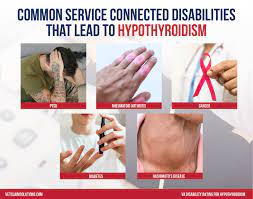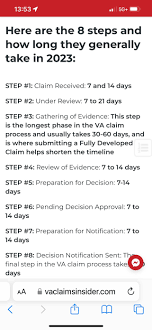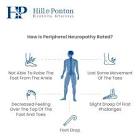Title: VA Disability Hypothyroidism Claims Granted: A Victory for Veterans
Introduction:
Hypothyroidism is a medical condition that affects the thyroid gland, leading to an underactive thyroid. This condition can cause a range of symptoms, including fatigue, weight gain, depression, and cognitive impairment. For veterans who developed hypothyroidism as a result of their military service, obtaining disability benefits from the Department of Veterans Affairs (VA) has been a long-standing challenge. However, recent developments have brought hope to many veterans as more hypothyroidism claims are being granted by the VA.
The Struggle for Recognition:
For years, veterans with hypothyroidism faced an uphill battle in proving that their condition was connected to their military service. The VA required substantial evidence linking their hypothyroidism to specific exposures or events during their service. This burden of proof often left many deserving veterans without the compensation they deserved.
A Turning Point:
In recent times, there has been a shift in how the VA evaluates hypothyroidism claims. The agency has recognized that certain factors associated with military service can contribute to the development of this condition. Exposure to environmental hazards such as radiation, toxins, and certain medications used during deployments have been identified as potential triggers for hypothyroidism.
Additionally, studies conducted by reputable medical institutions have provided compelling evidence linking military service and an increased risk of developing thyroid disorders like hypothyroidism. These findings have played a crucial role in changing the way the VA evaluates and grants disability claims related to this condition.
The Impact on Veterans:
The granting of disability claims for hypothyroidism brings immense relief and support to affected veterans. It not only provides them with financial compensation but also acknowledges their sacrifice and recognizes the impact that their military service has had on their health.
Receiving disability benefits can help veterans access necessary medical treatments and therapies for managing their condition effectively. It can also alleviate financial burdens and provide a sense of security for veterans and their families.
Navigating the Claims Process:
While the VA’s recognition of hypothyroidism claims is a positive development, veterans must still navigate the claims process to secure their benefits. It is crucial for veterans to gather all relevant medical records, including diagnoses, treatment history, and any evidence linking their condition to military service.
Seeking assistance from veteran service organizations or legal professionals specializing in VA disability claims can also be beneficial. These experts can guide veterans through the complex paperwork, ensure all necessary documentation is included, and provide valuable support during the appeals process if needed.
Conclusion:
The increasing number of VA disability hypothyroidism claims being granted is a significant victory for veterans who have long struggled to receive recognition for their condition. The shifting perspective within the VA and the acknowledgment of scientific research have paved the way for more equitable outcomes.
However, it is important to remember that every case is unique, and success in securing disability benefits relies on presenting a strong case supported by thorough documentation. Veterans should not hesitate to seek professional assistance when navigating the claims process.
As we move forward, it is our hope that this positive trend continues, ensuring that all deserving veterans receive the support they need and deserve for their service-related hypothyroidism.
Frequently Asked Questions: VA Disability Claims for Hypothyroidism
- What evidence do I need to provide for a VA disability claim related to hypothyroidism?
- How long does it take for a VA disability claim related to hypothyroidism to be approved?
- Are there any special criteria or conditions that must be met in order for a VA disability claim related to hypothyroidism to be granted?
- What types of benefits can I expect if my VA disability claim related to hypothyroidism is approved?
- Is there any way I can appeal a denied VA disability claim related to hypothyroidism?
- Are there any additional resources available that can help me with my VA disability claim related to hypothyroidism?
What evidence do I need to provide for a VA disability claim related to hypothyroidism?
When filing a VA disability claim related to hypothyroidism, it is essential to provide comprehensive evidence that establishes a connection between your military service and the development of the condition. Here are some types of evidence that can strengthen your claim:
- Medical Records: Gather all relevant medical records, including diagnoses, treatment history, and laboratory test results. These records should clearly indicate the presence of hypothyroidism and its onset during or shortly after your military service.
- Service Records: Include copies of your service records that highlight any exposures or events that could be linked to the development of hypothyroidism. This may include records of deployments to areas known for environmental hazards or exposure to radiation or toxins.
- Nexus Letter: A nexus letter is a crucial piece of evidence that connects your hypothyroidism to your military service. It should be written by a qualified medical professional who can provide a detailed opinion on the relationship between your condition and your military service.
- Buddy Statements: Sworn statements from fellow servicemembers who can attest to witnessing or experiencing similar exposures or events during their time in the military can strengthen your claim.
- Relevant Research Studies: Include any reputable research studies or literature that establish a link between military service and an increased risk of developing hypothyroidism.
- Independent Medical Opinions: If necessary, seek an independent medical opinion from a specialist who can evaluate your medical records and provide an expert opinion on the connection between your hypothyroidism and military service.
Remember, it is important to provide as much relevant evidence as possible to support your claim. If you are unsure about what specific documents or evidence you need, consider seeking assistance from veteran service organizations (VSOs) or legal professionals specializing in VA disability claims. They can guide you through the process and help ensure you have a strong case for receiving disability benefits related to hypothyroidism.
How long does it take for a VA disability claim related to hypothyroidism to be approved?
The processing time for a VA disability claim related to hypothyroidism can vary depending on various factors. The VA has been working to improve its claims processing times, but it is important to note that individual cases may still experience variations in the time it takes for approval.
On average, the VA aims to process disability claims within 125 days. However, it is not uncommon for claims to take several months or even longer, especially if additional evidence or information is required to support the claim.
Factors that can affect the processing time include the complexity of the case, the availability of medical records and supporting documentation, and any backlog or workload at the specific VA regional office handling the claim.
To help expedite the process, veterans are encouraged to provide comprehensive and well-documented evidence linking their hypothyroidism to their military service. This may include medical records, service records, deployment history, and any other relevant documentation. Seeking assistance from veteran service organizations or legal professionals who specialize in VA disability claims can also help navigate the process more efficiently.
While waiting for a decision on their claim, veterans can check the status of their claim through the VA’s online portal or by contacting their local VA regional office directly.
It is important for veterans to remain patient throughout the process and be prepared for potential delays. The most crucial aspect is ensuring that all necessary evidence is provided to support their claim accurately.
Are there any special criteria or conditions that must be met in order for a VA disability claim related to hypothyroidism to be granted?
Yes, there are specific criteria and conditions that must be met for a VA disability claim related to hypothyroidism to be granted. The VA requires evidence that establishes a connection between the veteran’s military service and the development of hypothyroidism. Here are some key factors that can strengthen a claim:
- Diagnosis: The veteran must have a formal diagnosis of hypothyroidism from a qualified healthcare professional. This diagnosis should be based on thorough medical examinations, blood tests, and other relevant diagnostic procedures.
- Service Connection: The veteran needs to provide evidence demonstrating that their hypothyroidism is related to their military service. This can include records of exposure to environmental hazards (such as radiation or toxins), deployment-related medications, or any other factors that could have contributed to the development of the condition.
- Nexus Statement: A nexus statement is a crucial piece of evidence in establishing service connection. It is a medical opinion from a qualified healthcare professional linking the veteran’s current hypothyroidism condition to their military service or an event during their service.
- Medical Records: Comprehensive medical records are essential in supporting the claim. These records should contain detailed information about symptoms, diagnoses, treatment history, and any other relevant medical documentation related to hypothyroidism.
- Supporting Documentation: Any additional documentation supporting the claim can be beneficial. This may include statements from fellow servicemembers who witnessed exposure events or statements from family members regarding changes in health after military service.
It’s important for veterans to gather all necessary documentation and evidence before submitting their claim. Seeking assistance from veteran service organizations or legal professionals who specialize in VA disability claims can help ensure that all requirements are met and increase the chances of a successful outcome.
It’s worth noting that each case is unique, and meeting these criteria does not guarantee approval of the claim. However, providing strong supporting evidence and meeting these requirements significantly improve the chances of having a VA disability claim related to hypothyroidism granted.
What types of benefits can I expect if my VA disability claim related to hypothyroidism is approved?
If your VA disability claim related to hypothyroidism is approved, you may be eligible for various benefits. Here are some of the benefits you can expect:
- Disability Compensation: This is a tax-free monetary benefit paid to veterans with service-connected disabilities. The amount of compensation depends on the severity of your condition and the impact it has on your ability to work.
- Healthcare Benefits: Approved disability claims make you eligible for healthcare services through the VA, including medical treatment, medications, and access to specialists. This ensures that you receive the necessary care to manage your hypothyroidism effectively.
- Vocational Rehabilitation and Employment Services: If your hypothyroidism affects your ability to work or pursue a career, you may qualify for vocational rehabilitation services provided by the VA. These services aim to help you develop new skills or find suitable employment opportunities.
- Dependents’ Benefits: If your disability is rated at a certain level of severity, you may be eligible for additional compensation for dependents such as spouses, children, or dependent parents.
- Special Monthly Compensation (SMC): In certain cases where the severity of your hypothyroidism results in additional physical or mental impairments, you may be entitled to SMC. This provides extra financial support beyond regular disability compensation.
- Home Loan Guaranty Program: Veterans with service-connected disabilities may qualify for home loan guarantees offered by the VA. These guarantees can help secure favorable mortgage terms and make homeownership more accessible.
- Adaptive Housing Grants: If your hypothyroidism has caused significant physical disabilities, you might qualify for grants to modify your home or purchase adaptive equipment that improves accessibility and enhances independent living.
- Education and Training Assistance: The VA offers educational assistance programs such as the Post-9/11 GI Bill® and Vocational Rehabilitation programs that provide financial support for pursuing higher education or vocational training.
It’s important to note that the specific benefits you may receive will depend on factors such as the severity of your hypothyroidism, your overall disability rating, and other individual circumstances. To get a comprehensive understanding of the benefits you are eligible for, it is recommended to consult with a VA representative or veteran service organization.
Is there any way I can appeal a denied VA disability claim related to hypothyroidism?
Yes, if your VA disability claim related to hypothyroidism has been denied, you have the right to appeal the decision. The appeals process allows you to present additional evidence or arguments to support your claim and request a review of the initial decision. Here are the steps you can take to appeal a denied VA disability claim:
Review the Decision: Carefully read through the denial letter from the VA. Understand the reasons provided for denying your claim and identify any potential errors or missing information.
Seek Assistance: Consider seeking assistance from a veteran service organization (VSO) or an accredited attorney or agent who specializes in VA disability claims. They can provide guidance, help gather necessary evidence, and navigate the appeals process on your behalf.
File a Notice of Disagreement (NOD): To initiate an appeal, you must file a Notice of Disagreement (NOD) with your regional VA office within one year of receiving the denial letter. The NOD is a formal statement expressing your disagreement with the decision.
Choose Your Appeal Lane: After filing an NOD, you will need to select one of three available appeal lanes:
– Supplemental Claim Lane: Submit new and relevant evidence that was not previously considered by the VA.
– Higher-Level Review Lane: Request a higher-level review by a more experienced adjudicator who will reevaluate your claim based on existing evidence.
– Board of Veterans’ Appeals (BVA) Lane: Request a review by an administrative law judge at the BVA who will assess all evidence and make a new decision.
Gather Evidence: Collect any additional medical records, opinions from healthcare providers, service records, or other supporting documents that strengthen your case. Ensure that these pieces of evidence directly link your hypothyroidism to your military service.
Submit Your Appeal: Depending on which lane you choose for appeal, follow the specific instructions provided by the VA for submitting your appeal. Be sure to include all relevant documents and clearly state the reasons why you believe your claim should be approved.
Stay Engaged: Throughout the appeals process, stay in contact with your VSO or representative and respond promptly to any requests from the VA for additional information or examinations.
Attend Hearings (if applicable): If your appeal reaches the BVA lane, you may have an opportunity to present your case at a hearing before an administrative law judge. Prepare yourself by reviewing your medical records and any other evidence that supports your claim.
Remember, the appeals process can be complex and time-consuming. It is essential to be patient and persistent. Seeking assistance from experts who are well-versed in VA disability claims can greatly increase your chances of a successful appeal.
Are there any additional resources available that can help me with my VA disability claim related to hypothyroidism?
Certainly! Here are a few additional resources that can assist you with your VA disability claim related to hypothyroidism:
- Veterans Benefits Administration (VBA) Website: The VBA website offers comprehensive information about disability compensation, including eligibility criteria, required documentation, and the claims process. You can visit their website at www.va.gov/disability.
- Board of Veterans’ Appeals (BVA): If your initial claim is denied, you have the option to appeal the decision to the BVA. Their website provides guidance on how to file an appeal and what to expect during the appeals process. Visit www.bva.va.gov for more information.
- Veteran Service Organizations (VSOs): VSOs like Disabled American Veterans (DAV), Veterans of Foreign Wars (VFW), and American Legion have accredited representatives who can provide free assistance in preparing and submitting your VA disability claim. They are experienced in navigating the VA system and can offer valuable guidance throughout the process.
- VA Regional Offices: Local VA regional offices have personnel who specialize in assisting veterans with their disability claims. They can provide personalized support, answer specific questions, and help gather necessary documentation for your claim.
- Legal Assistance: If you encounter significant challenges or need legal advice regarding your VA disability claim, you may consider consulting an attorney specializing in veterans’ law or seeking assistance from pro bono legal clinics that cater to veterans.
Remember, each case is unique, so it’s essential to consult these resources and professionals who can provide guidance tailored to your specific situation. Good luck with your claim!




